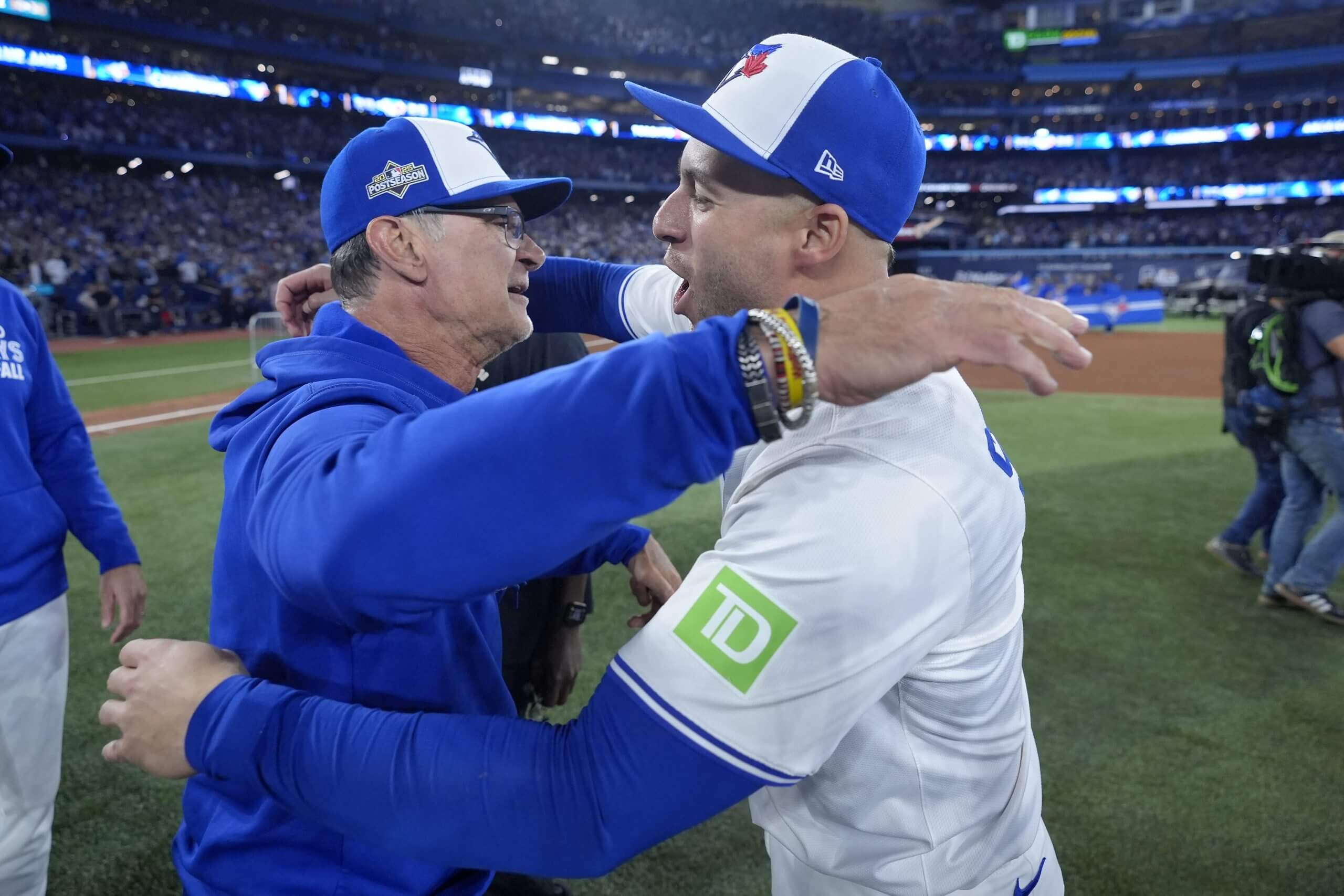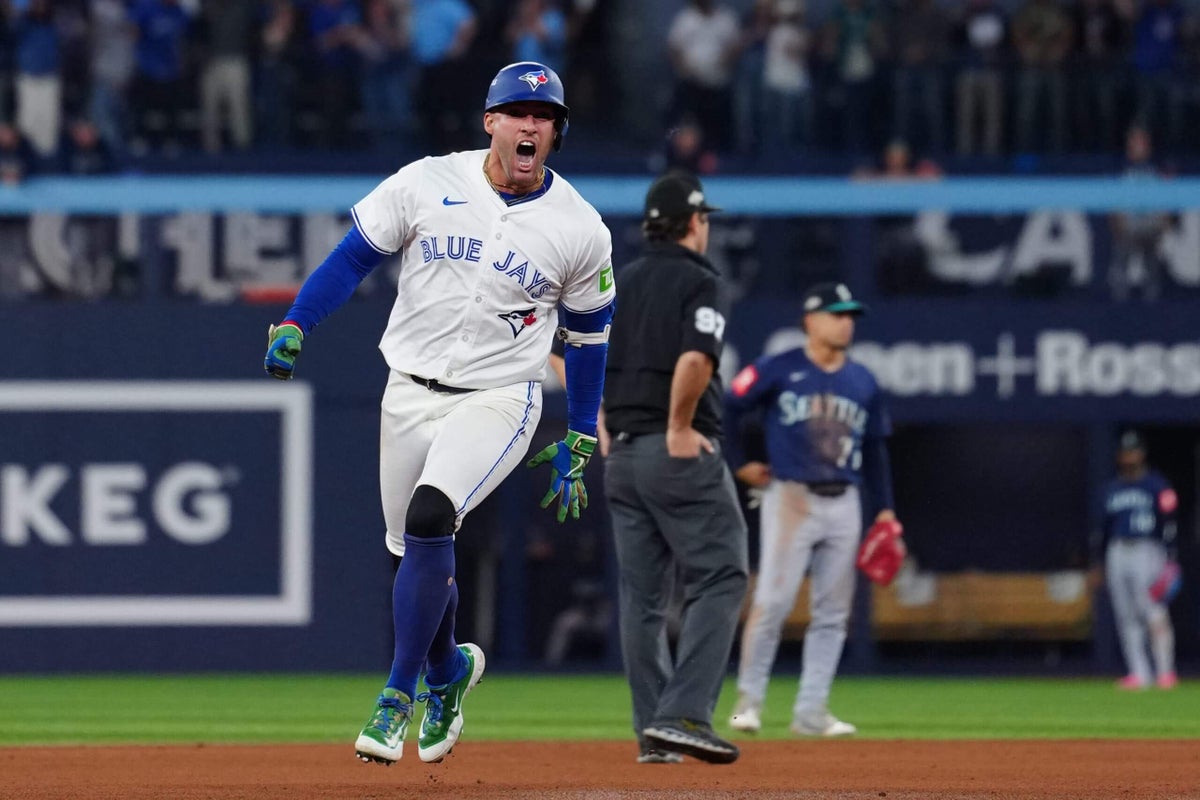TORONTO — Sitting on a couch in the visiting clubhouse after Game 5, Toronto Blue Jays hitting coach David Popkins offered George Springer words of inspiration.
“You’ve got a Kirk Gibson moment coming,” Popkins said. “You’re a legend. It’s your time.”
It was the kind of thing someone might say to a friend in need of encouragement, not expecting the message to resonate or even be taken as realistic.
Last Friday night in Seattle, with his right knee throbbing, Springer was in no position to act on Popkins’ vision. It was fantasy to think that just three days later, he would electrify a ballpark, a city and a country with a home run that was a little bit Gibson, a little bit Joe Carter and every bit heart and soul.
All Springer did with his three-run, go-ahead shot in the seventh inning Monday night was lift his team to a 4-3 victory over the Seattle Mariners in Game 7 of the American League Championship Series, bringing the World Series to Toronto for the first time in 32 years.
Springer’s resurgence in the regular season was difficult enough to believe considering he was 35, coming off two straight years of decline. But his resilience after getting hit in the kneecap by a 96-mph Bryan Woo fastball added an even more stunning chapter to his baseball saga, one that now includes 23 postseason home runs, tied for third all-time.
Springer left Game 5 in excruciating pain. He needed help getting down the dugout steps, and then the steps into the clubhouse. The next day was a travel day in the series. CT scans on his knee came back negative. And when manager John Schneider texted him the morning of Game 6, gently checking on his designated hitter, he said Springer essentially told him to shut up. There was never a question. Springer was going to play.
Before Springer took the field to warm up that night, he smiled weakly and said he was hanging in there. Leading off, he battled Logan Gilbert for nine pitches before popping out. In his second plate appearance, he drew a four-pitch walk.
His final three at-bats resulted in outs, with his condition seeming to worsen. But for Game 7, he was back in the lineup. Between at-bats, he again kept a wrap on his knee, offering him relief through heat and vibration.
Yet, it wasn’t just his knee bothering him.
“He’s so banged up, it’s unbelievable,” Blue Jays president Mark Shapiro said. “He’s gutting it out.”
Shapiro declined to specify which other parts of Springer’s body are hurting. So did Springer’s father, George Springer II (the son’s full name is George Chelston Springer III).
“There’s more going on, but you know what?” Springer’s father said. “He’ll overcome all of it. He’s a very unique talent, a unique person. And he has a unique psychological makeup that enables him to do these types of things.”
At this time of year, many players are dealing with injuries to some degree. Springer acknowledged as much before the game, saying, “At the end of the day, I don’t think really anybody cares. If you’re out there, you’re expected to play and you’re expected to perform.”
The elder Springer is a trial attorney. Often when he asks his son how he is doing physically, Springer responds less than honestly — I’m OK, I’m fine. This time, to his father at least, Springer acknowledged his discomfort. After he hit his three-run shot off Mariners righty Eduard Bazardo, skipping and shouting, “Let’s go!” as he circled the bases to a deafening roar, his father was moved to tears.
“I can’t tell you, I can’t even describe what this felt like,” Springer II said. “I had to take a break and go upstairs and cry for two innings. I was so overwhelmed with emotion, for him. Frankly, I’m very surprised he was even upright.”
How much pain was Springer experiencing?
“It doesn’t matter. It doesn’t matter,” he told me in his postgame interview on Fox. “I owe it to these fans, this city, this country to give it my all.”
Springer joined the Blue Jays on a six-year, $150 million free-agent contract prior to the 2021 season. His first season was marred by injuries. His second was closer to the standard he established with the Houston Astros. But his performance dropped off in his third year and cratered last season in his fourth, when he batted .220 with a .674 OPS.
Enter Michael Brantley, Springer’s teammate with the Astros in 2019 and ‘20. Brantley, who retired after the 2023 season, lives about 20 minutes away from Springer on the east coast of Florida. One day at the start of last offseason, Brantley called Springer and said, “I’ve got some stuff for you.”
“I went to his house every day for three months,” Springer said. “And here we are.”
The first thing Brantley told Springer was, “Get here by 8:30, don’t be late.” The two would hit in Brantley’s batting cage for an hour or so, and sometimes Springer would linger at the house longer, relaxing with his friend. Another Blue Jay in the area, infielder Andrés Giménez, also participated in the sessions. Brantley’s father, former major leaguer Mickey Brantley, often was present as well. But it was Michael who did the instructing.
Brantley instructed Springer to get his foot down early, feel the ground. Springer sent video of his work to Popkins, the Jays’ new hitting coach. Popkins said the sessions gave Springer a good foundation. But in spring training, Springer went 4-for-37. Only after he reincorporated his leg kick did his turnaround begin.
“When I saw it in spring, I was a little nervous,” Popkins said. “He was kind of two-parted. It was like, pick it up, put it down. The athleticism was gone.
“But I know what they were practicing. Eliminate all the other stuff, and just practice getting in the ground. It’s a good drill. It’s just not something you would do in the games.”
Was Springer worried in the spring?
“No. I knew the process was good,” Springer said. “I told them this: For me, in spring training you’re supposed to fail. I was trying different things, making sure I was in the right spot. I could tell as spring was unfolding that I was hitting the ball harder, more consistently. I just wasn’t getting hits. That, to me, indicated the process was working. I just needed to stick with it.”
Popkins and the Jays’ assistant hitting coaches, Lou Iannetta and Hunter Mense, emphasized to Springer that they wanted him to trust himself, get off his “A” swing, hit with intent. Once Springer had his mechanics straight, he was set to revive. And he did.
Springer started hot, tailed off a bit, then got even hotter. On July 1, Canada Day, he hit two home runs against the Yankees, including a grand slam, in one of the Jays’ biggest victories of the season. He ended up ranked third in the majors with a .959 OPS, behind only Aaron Judge and Shohei Ohtani. His 32 homers were his most since 2019.
Brantley, as reticent in retirement as he was as an active player, wanted no recognition for his role in Springer’s comeback.
“George deserves all the credit,” Brantley said. “He’s the one who put in all the work and had a fantastic year.”
After Game 5, in response to a question about Springer’s knee, Schneider criticized the Mariners fans who booed Springer when he was on the ground and cheered when he left the game. But Schneider stopped himself before he got carried away.
In the glow of victory Monday night, Schneider no longer could hold back.
“It’s kind of fitting that the guy that got booed when he got hit in the kneecap ended that team’s season,” the Blue Jays manager said.
Springer’s father was in the crowd at T-Mobile Park. He said he is accustomed to fans saying “vile and nasty” things at games, not just about his son, but also about other players, coaches, managers and umpires. Still, he thought the fans at T-Mobile crossed a line.
“The experience we had in Seattle the other day, I’ve never seen anything like that,” Springer II said. “It was just such a despicable display of sportsmanship, to boo somebody when they’re injured. And I get it. He’s a good player. It comes with the territory. I understand that. But not when somebody is hurt.”

Blue Jays bench coach Don Mattingly embraces George Springer shortly after the team’s pennant-winning Game 7 victory over the Mariners. (Mark Blinch / Getty Images)
At one point, the elder Springer turned to one fan and said enough. He asked the fan to stop and the fan did. The younger Springer, on the other hand, said he was only concerned about his health, explaining that the rest was out of his control. But the scene in Seattle only added to the emotion the Jays experienced Monday night after his homer turned a 3-1 deficit into a 4-3 lead.
The seventh inning started as many Jays rallies do, with contributions from the bottom of the order. Addison Barger walked. Isiah Kiner-Falefa singled to center. Giménez laid down a sacrifice bunt, advancing the runners to second and third for Springer. At that point, Mariners manager Dan Wilson summoned Bazardo rather than closer Andrés Muñoz, who had pitched only twice in the series.
Before the inning even began, Series MVP Vladimir Guerrero said he went down to the tunnel connecting the dugout to the clubhouse, got down on his knees and asked God for a win.
Ace right-hander Kevin Gausman, who had pitched a scoreless inning of relief in the top half, was one of a group of players watching on a clubhouse TV when Springer connected.
“We went crazy. We went absolutely crazy,” Gausman said. “We destroyed a small part of the clubhouse inside.”
Springer’s homer, coming as it did in Game 7 of the ALCS, was not the same as Gibson’s, a pinch-hit, two-run walk-off shot that decided Game 1 of the 1988 World Series. It also was not the same as Carter’s three-run, walk-off blast that ended Game 6 of the 1993 World Series, giving the Jays back-to-back titles.
Without question, though, the homer will stand as one of the biggest in Jays history, a Carter-like moment for a new generation of fans. And to think, Popkins envisioned it was possible almost immediately after Springer was injured, thought the 12-year veteran was capable of something that gutsy, that dramatic, that grand.
“I felt it was coming,” Popkins said. “He’s a big player. Big players have big moments. This was his moment.”
Not quite like Gibson’s. Not quite like Carter’s. One all George Springer’s own.

